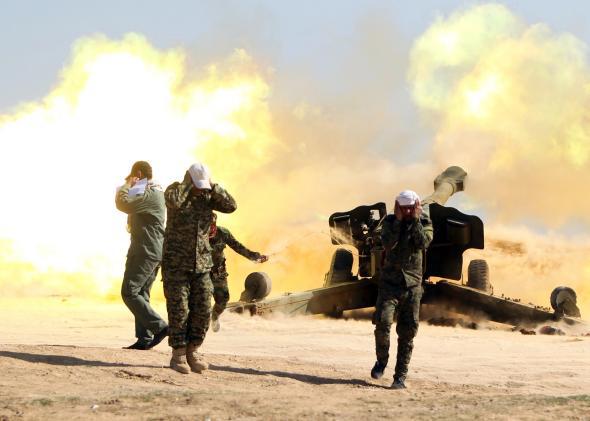For the past few days, Iraqi military forces and Shiite militias have been fighting to encircle the Iraqi city of Tikrit in a bid to drive out ISIS forces. But in contrast to other recent offensives, they are supported not by U.S. airstrikes but by Iran’s Islamic Revolutionary Guard Corps. According to some reports, Qassem Soleimani, the mysterious commander of the Revolutionary Guards’ international operations, is on the ground coordinating the attack.
Meanwhile, the Pentagon is backtracking on its recent surprise announcement of a U.S.-supported Iraqi and Kurdish offensive to retake Mosul this spring. After Iraqi officials expressed irritation at the oddly detailed announcement and the Kurds (among others) expressed doubts about whether the Iraqi military would be ready in time, U.S. defense officials now say the operation could be months away.
The Mosul campaign is still planned, and some optimistic U.S. officials are suggesting that a successful battle in Tikrit could set the stage for it, but the Iraq-Iran cooperation is definitely a sign that Baghdad isn’t particularly interested in conducting its war on Washington’s timetable.
Washington seems a bit unsure of how to feel about that. U.S. officials say the Iraqis did not ask for U.S. support in the Tikrit operation, but military commanders say they were aware of the operation to retake Saddam Hussein’s hometown in advance, even if they didn’t coordinate it. As one official told the Wall Street Journal, “any geography taken from ISIL is a good thing.”
Still, the increasing influence of Iran in Baghdad, and the fact that Iranian-backed Shiite militias are taking the lead in the fight against ISIS while the U.S. continues to debate the readiness of the official Iraqi army, cannot be good for the American push for Iraqi unity.
Joint Chiefs Chairman Gen. Martin Dempsey told the Senate Armed Services Committee this week that Iran’s role is “frankly only a problem” if it inflames Iraq’s sectarian tensions, but it’s frankly hard to see how it wouldn’t. The Shiite militias are accused of widespread human rights abuses against Iraqi Sunni civilians, and their prominent role in the fight against ISIS will only add to Sunnis’ mistrust of the government in Baghdad. This mistrust was part of what made it so easy for ISIS to capture so much of the country in the first place.
Sunni Arab governments may also balk at joining a campaign against ISIS if it looks like the end result will be an (even more) Iranian-dominated Iraq. And Israeli Prime Minister Benjamin Netanyahu made his feelings about Iran’s fight against ISIS clear in his speech to Congress on Tuesdy, telling the U.S. public, “the enemy of your enemy is your enemy.”
